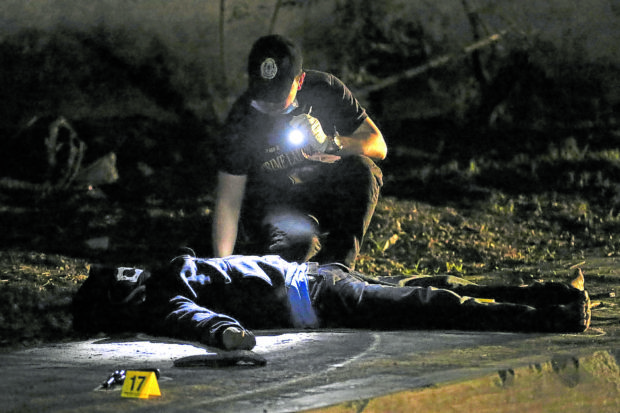PH at risk of political violence, says UK insurance firm

DRUG WAR: A police investigator inspects the body of a suspected victim of extrajudicial killing. —INQUIRER FILE PHOTO
MANILA, Philippines — The Philippines is at “very high” risk of political violence due to President Rodrigo Duterte’s deadly war against drugs and the still-present threat of religious extremists, according to the latest risk assessment of London-based insurance firm Aon.
“The risk of political violence is very high thanks to a still-present threat from the Islamic State, as well as President Duterte’s hard-line campaign against the drug trade,” Aon’s risk report said.
“The risk of doing business is still medium high due to rampant organized crime, which remains a consideration for both foreign investors and domestic businesses. The nation’s infrastructure is also in need of public investment,” it added.
On the other hand, Aon said economic risks were “medium low,” citing improvements in domestic demand that have driven strong economic growth alongside stable fiscal balance.
EU offers turned down
“However, rising credit levels in the private sector may require macroprudential regulation in the near- and medium-term,” Aon said.
Furthermore, Aon said the Philippines remained exposed to increasing US interest rates, capital outflows, and rising inflation.
Recently, the US Federal Reserve hinted that it would soon taper its aggressive monetary stimulus and start raising interest rates as early as 2023, sooner than what market consensus expected.
Aon noted that Duterte had turned down significant funding offers from the European Union to assist with sustainable energy projects as he opposed their “meddling.”
‘Medium-high’ risk on PH
Overall, Aon assigned a “medium-high” level of risk on the Philippines, comparable to the rating on Thailand, which has seen snowballing public opposition against the opulent new King Vajiralongkorn alongside calls for a new Constitution, an end to the harassment of dissenters and the resignation of the former head of military junta.
On the other hand, Aon’s overall risk rating on both Malaysia and Hong Kong are medium low while medium risk is assigned to Indonesia, India, and China.
On terrorism risks in the Philippines, Aon said it had seen few indications of a shift in the capabilities of Islamist militants operating primarily in Mindanao and Sulu, or armed communist groups who mount attacks nationwide.
“Both unrest and conflict perils reflect the continued potential for disputed territorial claims in the South China Sea to stir up tensions with China and anti-Chinese sentiment,” Aon said.
Aon’s high-risk rating for terrorism risk in the Philippines was the same as last year.
In the case of Thailand, Aon said the government was “unstable” following months of large-scale anti-government demonstrations that would likely continue this 2021 and increase the likelihood of a coup.
Aon’s risk levels represent assessments of the net level of risk. In measuring political violence risks, it assessed the frequency of occurrence and likelihood of exposure to political violence-related events, as well as their impact on businesses.